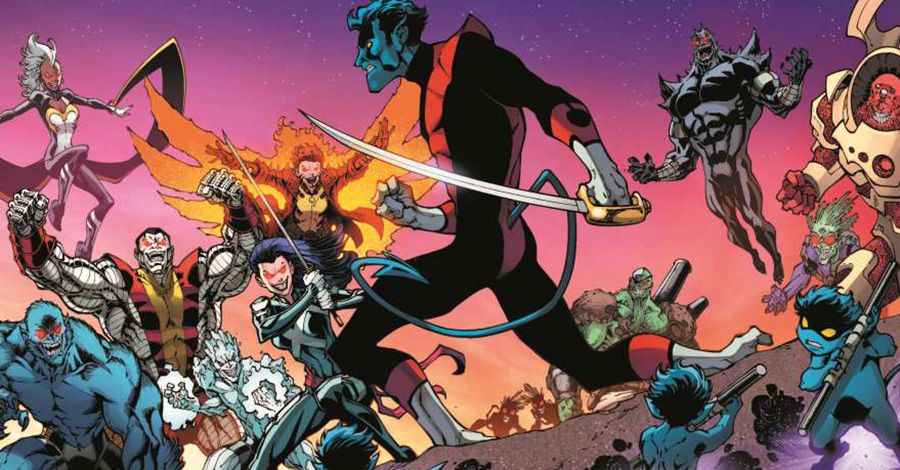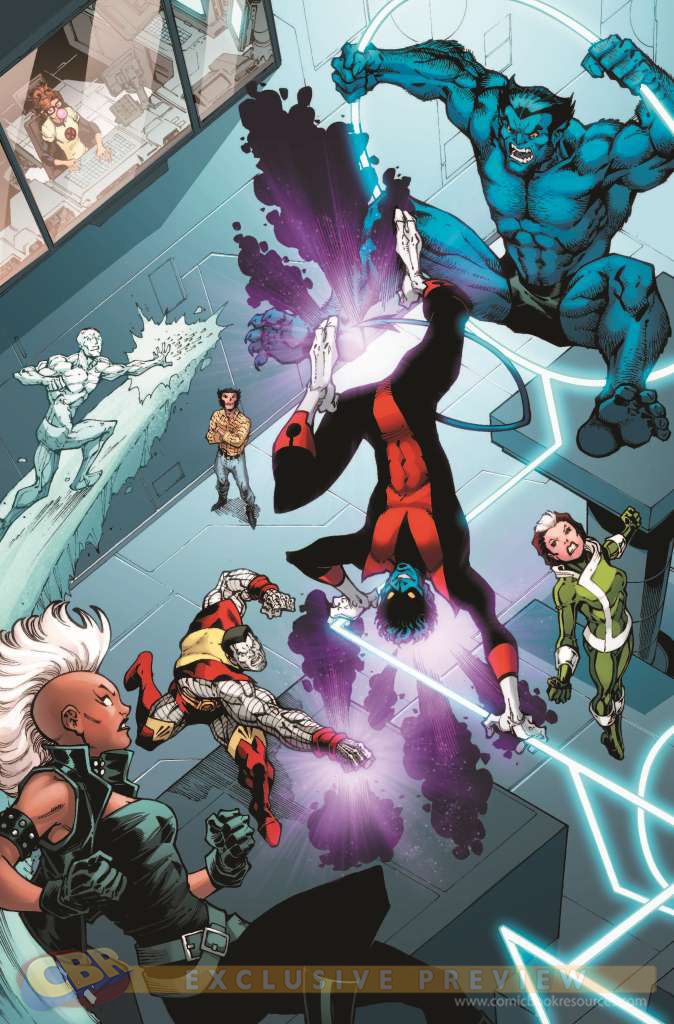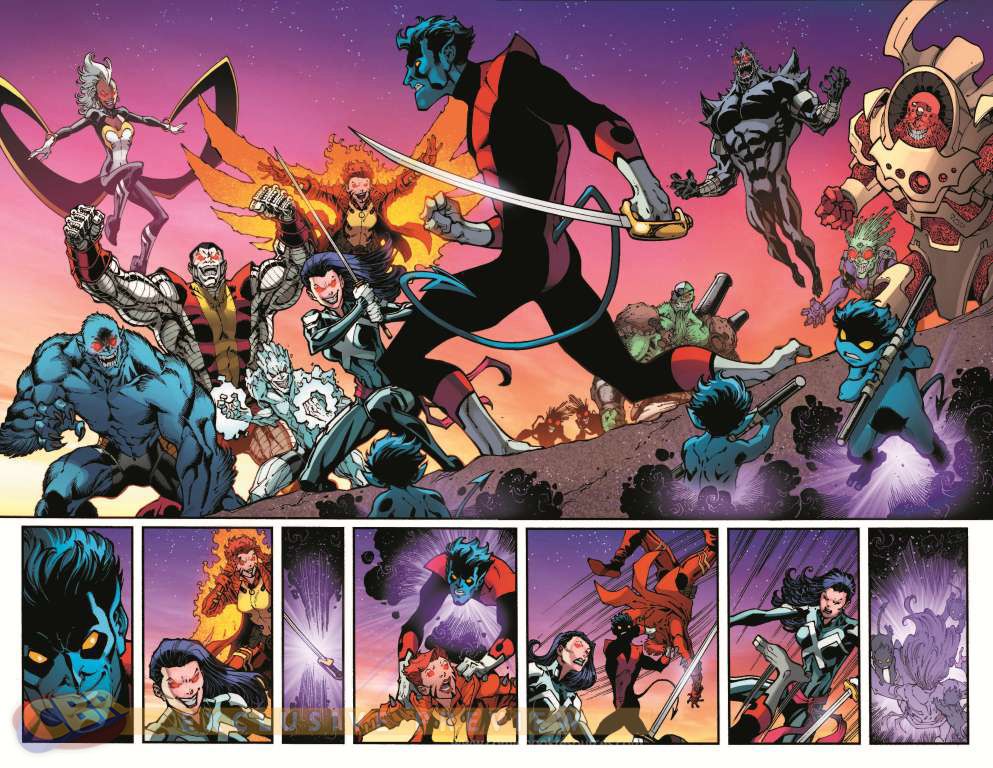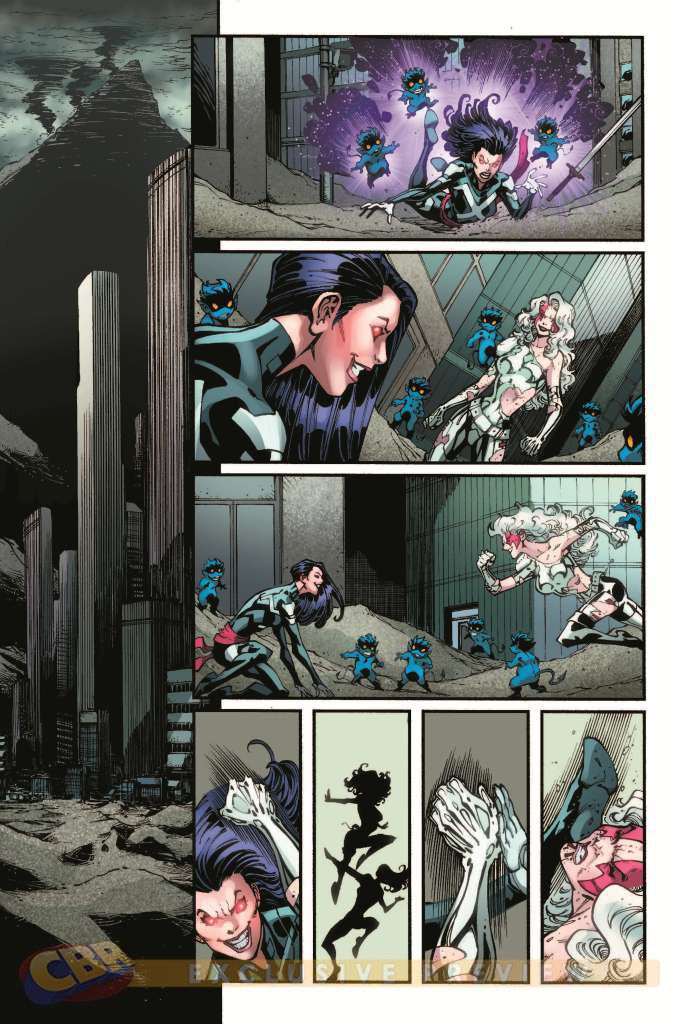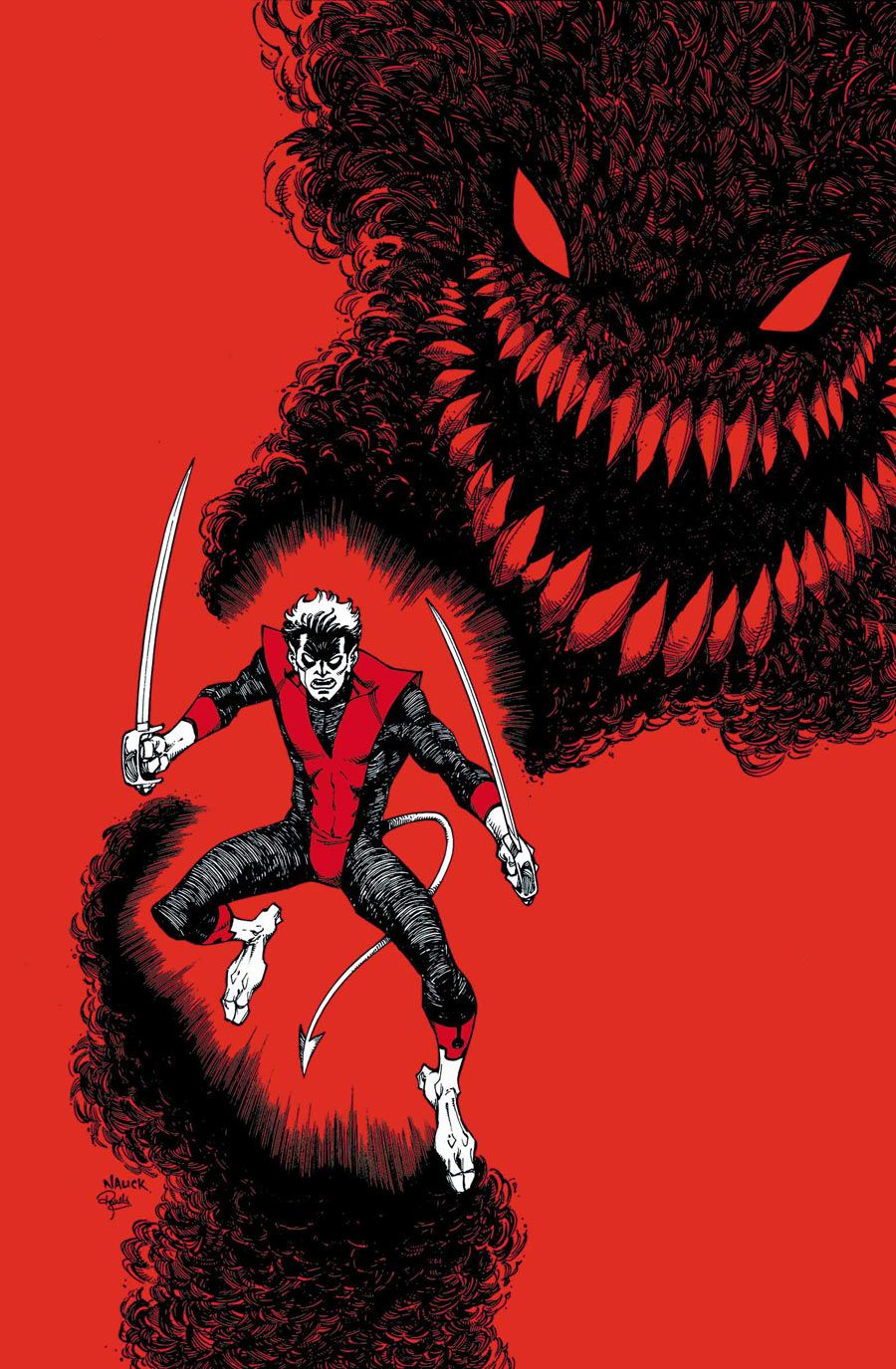What happens when a resurrected hero also happens to be one who is deeply religious, and how does this hero deal with how dramatically their friends -- and the world -- changed while they were gone? These are two of the central questions longtime X-Men scribe Chris Claremont and artist Todd Nauck have been exploring since "Nightcrawler" debuted in April.
Since the beginning of Nightcrawler's new series -- his first ongoing -- the X-Man has experienced his fair share of loss, including his childhood love Amanda Sefton and his longtime friend and teammate Wolverine. Now, the teleporting blue elf is set to take on a whole new challenge: the Shadow King.
CBR News spoke with Claremont about Nightcrawler's feelings on death and resurrection, his coming confrontation with the Shadow King, and the appeal of a long-term collaboration with artist Todd Nauck.
CBR News: Chris, "Nightcrawler" #7 saw Kurt Wagner mourn the death of Wolverine. One of the story beats in the issue was that the loss of team members -- and sometimes their return -- is part of being an X-Man. After recently returning from the afterlife, Kurt has had to deal with three big losses: Charles Xavier, his love Amanda Sefton, and now Wolverine. So what's his state of mind going into issue #8? How have these losses affected him?
Chris Claremont: I have to admit, as a creator looking at this and I suppose Kurt as a character looking at this, on the one hand there is the concept of death -- on the other hand though, he's seen Jean die twice. He's seen Colossus die. He knows of Captain Britain dying at least twice. Kitty was trapped in a giant celestial bullet that travelled across the galaxy. Betsy [Braddock] has died at least once.
So as Kurt says to Rachel at the end of the issue, it's not like we haven't done this before. It's not like we haven't discovered that there are rules beyond rules and some times the celestial pattern seems to give X-Men a do over. I think from his point of view, and if I get to fulfill the plan I have in mind for upcoming issues, he's going to confront that reality on a lot more specific and personal a note.
From his perspective as a person of faith, on one level it's literally God's will. I'm back, so I must be back for a reason. Therefore I must do my best to justify in the best of all possible terms my resurrection by finding the reason I'm here and fulfilling it. In the mean time I should enjoy the life I have and try to bring that joy to those around me. My sense of Logan as a character is that he wouldn't want anybody to grieve over him. He'd want Kurt to embrace the life he has and live it as or better than he would if Logan were still alive.
It seems like death almost renews Nightcrawler's sense of purpose and makes him strive to be even better.
I think for Kurt, death has a mixed meaning in the same way it does with Betsy. She was well and truly dead and yet she came back. Kurt was well and truly dead and even ignoring the reality that he was sitting on the edge of forever and looking back at reality, as I believe he did at the opening of his resurrection arc in "Amazing X-Men," he came back. So there has to be a reason. He may not understand the reason, but he's only human. So he'll just keep going and trust to his faith. Because the point with Kurt is he has an advantage or maybe a disadvantage over his friends and colleagues who are also people of faith. They don't know the secrets because they haven't been there.
If he sits down and talks with his friend who is a priest he can say quite legitimately, "I have been there and come back. Our faith is valid. I have seen and passed through the Heavenly Gates. I have met the Cherubim. I have stood beside the Archangels." But how then is his coming back an expression of that faith? The whole idea of faith is that you believe in something with no tangible proof. Now that he has tangible proof what does that do to his faith? It gives him a sense of balance and a sense of purpose. I think it also allows him to be an anchor for all of his friends, colleagues, and perhaps the students around him when they need him.
There's a mini-series I played around with doing, but no one at Marvel was really interested in it where I wanted to take the characters who had passed and tell the story from their perspective. Part of that was because Thunderbird had been off the board for almost 40 years and I wanted to see what we could do other than the two-parter that Louise Simonson and I wrote [2010's "Chaos War: X-Men"].
One of the elements I wanted to bring in was that it would not just be humans. It would be a couple of recognizable X-Men and characters of that nature, but there would also be a couple of aliens. One of them would be the Brood Queen. The question would be how could the Brood Queen be in Heaven? But nothing she did was evil. It was all done in the context of her own faith, beliefs and approach to life, death and reality. The revelation would be that there are things that are good and there are things that are truly evil. So you take your stand, and the idea is that our perception of what might be a hero or a villain versus someone else's or the overall scheme of things there might be extras and nuances, which bump up against preconceived perceptions.
It might not be feasible and the fact that the concept hasn't found an empathetic voice in the editorial corps could be an answer to that. The idea intrigues me though. It was something I wanted to play with, the idea that what may seem good and evil to us may not be absolute in the scheme of things or it might. You take it a step at a time and see where it leads and show them some surprises along the way.
Nightcrawler has lost some people, but he's also gained others -- like his Bamfs, who are characters you seem to really enjoy writing. What do you think the Bamfs add to the book?
I think they add mystery in terms of where they come from. Who created them? Why are they here? What's their purpose other than to be a giggle? Are they here to back Kurt up or lead him to a destination? Ultimately are they really good? Or not?
That would be a question for a long-term perception of the series, and in this current editorial reality I'm not altogether sure how much flexibility or how much actual room there is for a long-form series. Everything seems to be viewed from a much more specific and sustained perspective than for want of a better phrase, "the old days."
Another new friendly face in "Nightcrawler" is the young mutant Rico, who made his debut in the series first issue. Will Rico appear again in upcoming issues?
Oh yeah, he's a regular character. In terms of the students Rico and Ziggy [who debuted in "Nightcrawler" #5] are basically our go-to characters.
Both Rico and Ziggy show up in issue #8 and hopefully subsequent issues. Also a major new wrinkle in Kurt's life reappears in issue #8. Sometimes you can end up having the wrong girl all together fall for you, or fall for the all together wrong girl.
Let's talk a little bit more about issue #8 and that wrong girl. Is it Bloody Bess, a character you created back in 2000 and who Nightcrawler crossed paths with in issue #6?
Yes, as a matter of fact, it is Bess. This next arc will reveal who she is.
It did seem like you were seeding a mystery in issue #6 when Nightcrawler commented on how her voice seemed familiar.
Yes, she's all together familiar. It's just that nobody has ever seen her in context so they haven't made the connection yet. That will happen. [Super Villain Laugh]
Did Nightcrawler cross paths with Bess in 2000 with the X-Men battled the Crimson Pirates?
No because he was still with Excalibur and they only showed up in "X-Men" and "Uncanny X-Men." My run at that iteration didn't last long enough to do anything substantial. It was only really nine issues of one and seven or eight of the other.
So these were all plans that I had back in the day that I'm kind of bringing to fruition now. If for no other reason than the nice thing about my lost arc of X-Men is it created a chunk of characters that clearly no one else has been interested in using, which are available for me; possibly the Neo, definitely the Crimson Pirates, the Technet and stuff like that.
That way I don't have to pillage or argue with anybody else who is using X-related characters. There are so many books working on so many integrated story arcs and purposes and for better or worse I'm about as out of the editorial loop as you can get. I'm just doing the one peripheral title. Ideally we don't interfere with anyone else. Although we bring back an old adversary in issue #8 and put the core cast of X-Men through some awkward situations, let us say.
In "Nightcrawler" you've been getting reacquainted with some of the other X-Men besides your title character. What's it like coming back these characters?
They're all fun. The disadvantage is with that number of characters and the amount of pages we have it's hard to focus in on any one character especially when they're not part of your core continuity.
For example, apparently Ororo is going through a whole iteration these days with her own position amidst the X-Men and amidst society in general that I knew nothing about until the comics actually see print. So there's no way to anticipate how those elements can interact, because how do you anticipate something you know nothing about? That means we start from the basic presumption that the reality is the school. We take things from there and in my case I depend on Daniel [Ketchum, "Nightcrawler" editor] to keep the ship on a straight course.
If there's a question regarding, which characters are available to use or reasons why they can't be used I send a query. He passes the query up the line through the X-Department or across to the other departments so we can figure out who's available and who isn't, and what the situation is.
So I try to keep "Nightcrawler" on a fairly singular and isolated track basically because there's far less risk of stepping on any one else's toes, which no one wants to do.
In "Nightcrawler" #9, you'll return to another character you co-created, the Shadow King. When the Shadow King first appeared back in "Uncanny X-Men" #117, he was just Amahl Farouk. Over time, the character has evolved almost into a malevolent psychic entity. Was that always your intention with the Shadow King?
Yes, he was meant to be their unrelenting bad guy. That was the whole point of the conflict back in "The Muir Island Saga" with the two teams coming back together and standing up to fight Farouk as he's trying to take over everything.
No matter how hard you try you can't get rid of him. My basic intent in those days was since my ambition was to reform Magneto the Shadow King was one of the entities that I was grooming to present to the readership to take his place as the X-Men's premier, classic, unrelenting villain. The whole essence of him was no matter how hard you try to kill him, you can't. What makes him even worse is his ability to get his hooks in an innocent character and corrupt them perhaps irredeemably.
So an argument or a hypothesis I would play with would be is if Cyclops falls in love with Emma is that him? Or her? Or is one of them under the influence of the Shadow King? Or are both of them of under the influence of the Shadow King? And where might that lead? That was one of the elements I was playing with back in the day.
What sets the confrontation between Nightcrawler and the Shadow King into motion?
An unexpected call for help takes Kurt to the far side of the world -- things kind of go both uphill and downhill from there. What if you just lost the great love of your life and suddenly you discover she has competition? As bad as things seem on page 6, by page 20 they're infinitely worse.
The last time the Shadow King was part of a major story was in "Uncanny X-Force." At the end of that story he was in the custody of Kurt's friend and former Excalibur teammate Captain Britain. Will you get to write Captain Britain again in this story?
No, the original story concept involved Kurt and Brian [Braddock AKA Captain Britain], activities in England and reunions with old friends. I think Daniel's concern as Editor is to keep the book more focused and more essential than in my case, where I'll throw in everything plus the kitchen sink just to keep it interesting and provide more possibilities down the road. So what we have is consistent with established continuity with a few modifications.
Todd Nauck has been the artist on "Nightcrawler" since day one. What's the appeal for you of a long-term collaboration with him?
Yes, he's drawn them all from the beginning, which has been a delight. To me the essence of a good book is finding a simpatico team and holding on to them for as long as humanly possible. That way you can build an ongoing with a commercial relationship with the audience.
If they like the first issue by me and [Dave] Cockrum, they'll stick around for the next issue and the ones after that. Then if we have to do a change, let's go to John Byrne because John is really cool. John Byrne and Terry Austin turned out to be extremely cool and that lasted for 35 issues. Then out of sheer dumb luck, we managed to bounce back to the creator of the team for the next couple dozen of issues.
What we ended up with on "Uncanny X-Men" was an extraordinary confluence of simpatico voices and consistency over the first six years of the book if not more. That gives you a tremendous foundation of material to build from -- because in those days, we worked on things totally for the long haul. How can you get decent sales, keep them and increase them? How can you keep the audience coming back for more with eagerness and enthusiasm?
I'm trying as hard as I can to replicate that perspective today, even though it's the 21st century and it's 40 years later -- God help me. I don't see why that isn't a valid argument. If we can come out every issue and say, "Hey we got this really cool artist and he's pencilling Kurt in an exciting and dynamic light come along and have some fun!" Because the thing we can say about next issue is it will be even more visually cool than this issue. And the issue after that will be even better.
If we were bouncing around from artist to artist it would be like coming back every week to a TV series and suddenly the characters all look different. They're the same characters but they're played by different actors and you think, "What?"
While Nightcrawler has certainly had his fair share of hard times during the course of the series, he still manages to stay upbeat. Why do you think that is?
Well, Nightcrawler is back to life after being dead. He's come back after discovering his faith is not simply faith -- it's reality. Plus, he's been given a chance to rejoin his best friends and take care of a bunch of young people while fighting the good fight and trying to make the world better.
Kurt is just a shameless idealist. Perhaps that stems from how he looks. He's like, "I may be stuck with a physiognomy that most people would register as a demon, but just because my exterior looks one way doesn't mean my soul and heart follow that lead. Why make presumptions? Why not just accept me as I am? A decent soul trying to do the best he can with the life that he has."
With Kurt, that's always been the case. One story that I'd like to do that I don't think is really in the cards is to resolve the situation between him, Kitty and the X-Men. She's off on her own with the original X-Men and, as I understand it, there's a perception of a rift between her and the school. I don't entirely get that, and in that I guess I bond with Kurt.
That's a decision that comes through a much higher authority than even just an editor, because it deals with major ongoing story arcs and multiple writers and editors. That's me as a fan though. In the meanwhile, we deal with what we can deal with and leave those circumstances to the themes that occur between the borders of the panels or between issues. We'll get to it when the opportunity arises.
The beauty about writing Kurt is he covers the full spectrum of possibilities. One of the most unexpectedly delightful realities of "X2," Brian Singer's second X-Men film, was Alan Cumming's presentation as Kurt. He's literally the last character I expected to be brought to life and certainly not so three dimensionally and eloquently as Alan did it.
The idea is that if a gifted actor can walk in and take this guy and do magic with him on screen, I as a writer have to find a way to at least match him and hopefully top him on the printed page. With Kurt, you have a wealth of physical schtick that you can play with like his teleporting, agility and ability to climb walls -- all the best of Spider-Man plus dancing around and being in 50 places at once. You also have the inner struggle of a man of faith trying to find his way in a world that is not always simpatico with the ideals of faith. The nice thing about Kurt is that every answer leads to more questions, but all the questions lead to substantially positive resolutions.
We still have a whole host of potential arcs. I'm not saying they're in the pipeline, but here are some thoughts: we have all the circumstances with his parents -- his mother for certain and his father icky though he is. How do we deal with that? Or does someone on the team want to deal with it for him? We have the scene at the end of issue #7 where the question Rachel asks is, "Did you see my mom when you were in heaven?" His reaction is that he doesn't talk out of school, but boy he'd love to see someone try and keep Logan away from her. [Laughs] Of course, another question is where's Mariko? After all that happened to her is she even there? She might be on the other side of the coin -- or Jean might.
The point is that for all their experiences saving the Omniverse, being super heroes, living, dying, resurrecting and going to other dimensions my perception of these characters is that they are all comparatively young and definitely works in progress, even Magneto. So the journey forward can have lots of branches to the right and to the left, pauses, frustrated turnarounds, you name it. The essence is always though to keep them at a point where the audience wants to come back and see what happens next as it is ideally in the best of lives.
Plus, the audience will hopefully want to root for them and won't take their lives, existence, and victories for granted. Maybe if we're very lucky we'll catch them off guard with an unexpected revelation or conclusion that will both satisfy and intrigue them. Leave them wondering, "Where did that come from? What happens next?" Because we're both creative types and crass commercial folk. I won't speak for anyone else, but damn it, I want those readers coming back for more and I want more readers each time. Hopefully, by doing the best that I know how and presenting Kurt and his adventures in the best manner possible, I can get away with that.

